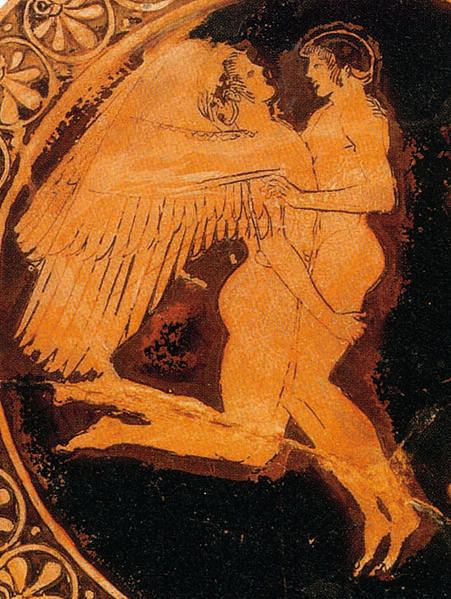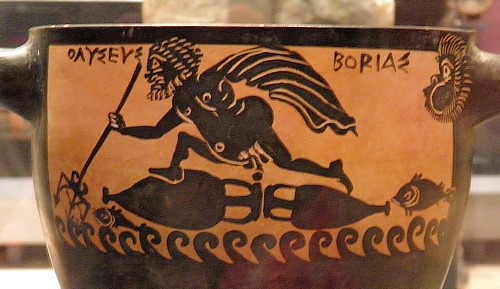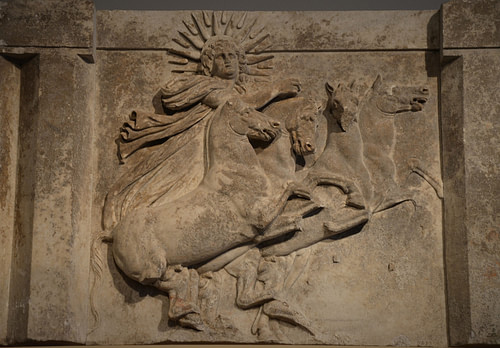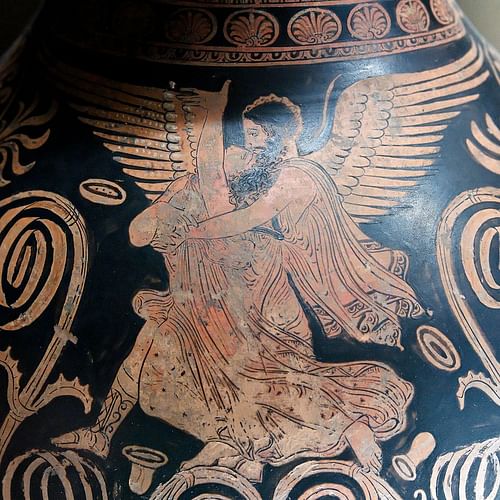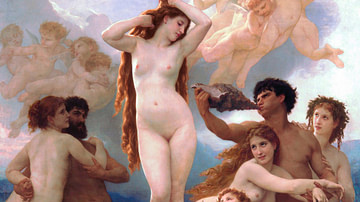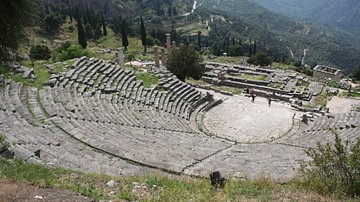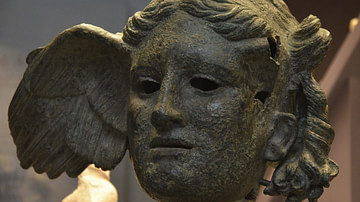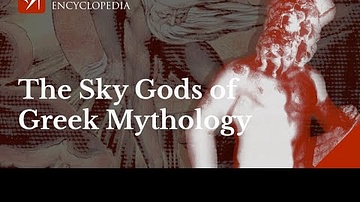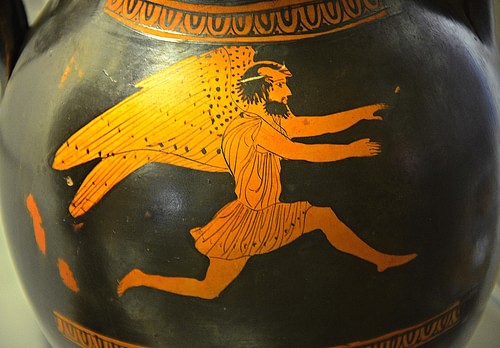
Boreas is the god of the violent North Wind in Greek mythology. He is the son of the Titan Astraeus and Eos, the goddess of the dawn, and brother to Zephyrus (the West Wind) and Notus (the South Wind). He is best known for his bad temper, his abduction of Oreithyia and his association with horses.
He lived in Thrace, to the north of Greece, where he blew on the open sea, whipping it into a frenzy and causing the earth and forests to howl in the wind. He brought down large oaks and thick-branched pine trees, and his very force made animals shiver in fear and cold, their thick fur being no defence against the North Wind.
Birth & Family
Boreas is the son of the Titan Astraeus and Eos, the goddess of the dawn and the brother of Zephyrus (the West Wind) and Notus, the South Wind.
And with the god Astraios, Eos lay
In love, a goddess herself, and bore the winds
With mighty hearts: the cleansing Zephyros,
And Notus, and swift-racing Boreas.
His bad temper often contrasted with his more gentle brothers, Zephyrus and Notus. They were collectively known as the Anemoi in Greek mythology. In later traditions, Boreas was said to have been a lover of the nymph Pitys and the father of two sons, Butes and Lycurgus, with two different mothers.
Boreas & Orithyia
The most famous myth associated with Boreas is his abduction of Orithyia. Orithyia was the daughter of Erechtheus, king of Athens and his wife, Praxithea. Boreas had long harboured feelings for Orithyia and repeatedly asked King Erechtheus for her hand, only getting vain promises in return. Finally, Boreas reached the end of his patience and resorted to his natural violence by kidnapping Orithyia as she danced on the banks of the River Ilissus. Some sources state that she was kidnapped as she was taking part in the annual Thesmophorian procession, which took place on the Athenian Acropolis, on the trail to the temple of Athena.
Erechtheus
should not have been kindly asked but made to give me
his daughter.
With boisterous words like these, or others of
similar fury,
Boreas beat the air with his powerful winds, and a
howling
blast swept over the earth and ruffled the breadth of
the sea.
(Ovid, Metamorphoses, 6.700-705)
Boreas swept Orithyia up in a cloud of wind and carried her off to the Thracian Cicones, where she became his wife and bore him winged twin sons, Calais and Zetes (two of the fastest Argonauts) and two daughters, Cleopatra (who ended up becoming the wife of King Phineus of Salmydessus in Thrace) and Chione (who bore a son with Poseidon). As a result of the marriage between Boreas and Orithyia, the Athenians viewed Boreas as their relative through marriage.
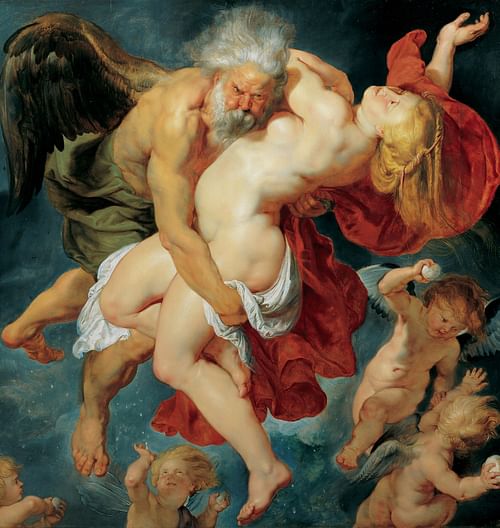
Orithyia's abduction is referenced in Plato's (l. 428/427-348347 BCE) Phaedrus when Socrates and his companion Phaedrus travel to the Attic countryside. As they arrived on the banks of the River Ilissus, Phaedrus asked Socrates if it was the site of Orithyia's abduction by Boreas. Socrates replied in his usual philosophical manner by simultaneously dismissing and using Greek myth. He stated that Boreas was not a god but the North Wind, which pushed Orithyia off a cliff above the Ilissus as she played with the nymph Pharmaceia.
Boreas as the God of the North Wind
According to Herodotus (c. 484-425/413 BCE), due to their fondness of Boreas and the advice of an oracle, the Athenians called on him for help in 480 BCE when Athens was under threat from a Persian invasion. Answering their calls for help, Boreas scattered and destroyed the Persian fleet, just as he had done twelve years earlier. Herodotus voiced his doubts that the eradication of the Persian fleet was a direct result of Boreas. However, he stated that the Athenians were so sure that he had answered their calls for help that they built a shrine for him on the banks of the River Ilissus.
In Homer's (c. 750 BCE) Iliad, Boreas, along with his brother Zephyrus are invoked by Achilles when Patroclus' funeral pyre would not catch fire. Achilles promised sacrifices and wonderful offerings to the gods if they answered his prayers and helped light the pyre. Iris heard his prayers and rushed to Zephyrus' halls to convey Achilles' message.
Message delivered, off she sped as the winds rose
with a superhuman roar, stampeding clouds before them.
Suddenly reaching the open sea in gale force,
whipping whitecaps under a shrilling killer-squall
they raised the good rich soil of Troy and struck the pyre
and a huge inhuman blaze went howling up the skies.
All night long they hurled the flames – massed on the pyre.
(Homer, Iliad, 23.242-249)
Boreas is also mentioned in Homer's Odyssey. Athena controls the North Wind to help Odysseus reach landfall after Poseidon attempts to kill him by whipping up the waves in a mad frenzy.
Boreas as Father of the Horses
Boreas was closely associated with horses and sometimes referred to as the 'father of horses' due to his encounter with the mares of King Erichthonius of Dardania. King Erichthonius was the wealthiest man in the world who owned 3,000 beautiful mares in their prime. Boreas lusted after these mares, transformed himself into a black stallion, and mounted several of them. The mares bore Boreas twelve colts who could swiftly race over fields filled with corn and grain without breaking them and who could run over waves.
The Competition Between Boreas & Helios
As is common in Greek mythology, Boreas and Helios, the god and personification of the sun, faced off against each other in competition. They both claimed that they could undress a travelling man first. Boreas blew his icy wind at the man, which only made him wrap his cloak more tightly around him and take refuge in a cave. Helios tried the opposite tactic by gradually increasing the temperature until the traveller came out of the cave, undressed and bathed in the river. Sophocles (c. 496 to c. 406 BCE) recounts this fable to Euripides (c. 484-407 BCE) to demonstrate how kindness and gentleness (Helios) always beat violence and harsh treatment (Boreas).
Boreas & Leto
Leto was a Titaness who became pregnant with Zeus' children (Apollo and Artemis) around the time that Zeus and Hera married. As such, she had a vengeful Hera after her. And as a result, she was turned away from many lands after Hera had threatened anybody who offered Leto a safe place to give birth. She also forbade her children to be born wherever the sun shone.
Leto arrived in Panopeus and Delphi, where she found the monstrous serpent Python, which Hera had sent. When it was time for Leto to give birth, Zeus called upon Boreas to rescue her and carry her to Poseidon, who then took her to the island of Delos, where she gave birth to Apollo and Artemis.
The Hyperboreans
Hyperborea was a nation located beyond the North Wind (thus its name). The ancient authors all identify Hyperborea as being located in different places – with the general consensus being that they were all lands found to the north of Greece, namely Scythian lands. It is a place that was unaffected by the sun going down, and it was located in an otherworldly paradise that was difficult for mortals to reach. Access had to be granted by the gods. Hesiod mentions the Hyperboreans as being good with horses which was another way they were linked with Boreas.
According to mythological traditions, Boreas lived in a cave which may be the same cave today known as the 'Cave of the Winds', located in a mountain pass and mentioned in Asiatic folklore.
Orphic Hymn to Boreas
The Orphic Hymns are a collection of religious Greek hymns which invoke the Greek gods and are part of the ancient religious movement known as Orphism, whose beliefs and literature were credited to Orpheus. They worshipped Dionysos and Persephone.
The Orphic Hymn 79 (or 80, depending on how they're counted) is dedicated to Boreas:
Boreas, whose wint'ry blasts, terrific, tear the bosom of the deep surrounding air;
Cold icy pow'r, approach, and fav'ring blow, and Thrace a while desert expos'd to snow:
The misty station of the air dissolve, with pregnant clouds, whose frames in show'rs resolve:
Serenely temper all within the sky, and wipe from moisture, Æther's beauteous eye.
Appearance
Boreas is depicted in art as a bearded and winged figure with either shaggy or spiky hair. He often wears a short pleated tunic. He is also sometimes depicted with serpent tails instead of feet. His abduction of Orithyia is a common scene found in ancient Greek pottery.
Worship of Boreas
The Cult of Boreas was believed to have originated in Libya before fading away and being suppressed in certain parts of Greece, such as Athens. However, it was not until after Athens was saved from the invading Persian forces that the Cult of Boreas was revived – this time with a strong presence in Athens. Pausanias (c. 115 CE to c. 180 CE) stated that he also helped defend the town of Megalopoli (Southern Greece) against the Spartans and earned annual sacrifices in his honour.
The Thourians (from Thourio, Greece) also offered an annual sacrifice to Boreas after he had destroyed a fleet of ships belonging to Dionysios I of Syracuse, who had attacked them. A decree was put in place, which offered Boreas a piece of land and a house. This was their way of adopting the worship of Boreas.
According to Herodotus, as the Greek navy sailed to the Cape of Artemision to face the Persian army, the Delphians invoked Apollo, and an oracle was sent to tell them to pray to the winds. The Delphians relayed the message to the rest of the Greek army. After they were victorious, the Delphians dedicated an altar to the winds near Delphi and offered sacrifices to Boreas there.
Herodotus believed that a Festival of Boreas was initiated during the Persian War. However, information about it is scarce, and the only thing known is that banquets were held in honour of Boreas during the festival.
